Zdeněk Dvořák, Special education needs teacher, Czech Republic
 Acrobatic numbers causing heart beats to stop, wild animals doing drills our brains cannot comprehend and an ever-present clown acting as a little rascal to entertain the crowd. All this and more can be seen at a circus, a magical place that attracts children from all corners of the planet. Admirer of this craft or not, one cannot deny these ‘families of the circus’ one thing – they live nomadic lives full of hard work and a sense of duty, where the only gratitude they receive is applause and satisfied faces in the audience, though the faces are actually often unsatisfied and cruel in their judgment. Zdeněk Dvořák is one who has ventured out to investigate the life of the circus. He found himself in the best position to do so – he met the ringmaster of Circus Jo-Joo himself and prepared an invaluable report about these nomadic folk. (WoL)
Acrobatic numbers causing heart beats to stop, wild animals doing drills our brains cannot comprehend and an ever-present clown acting as a little rascal to entertain the crowd. All this and more can be seen at a circus, a magical place that attracts children from all corners of the planet. Admirer of this craft or not, one cannot deny these ‘families of the circus’ one thing – they live nomadic lives full of hard work and a sense of duty, where the only gratitude they receive is applause and satisfied faces in the audience, though the faces are actually often unsatisfied and cruel in their judgment. Zdeněk Dvořák is one who has ventured out to investigate the life of the circus. He found himself in the best position to do so – he met the ringmaster of Circus Jo-Joo himself and prepared an invaluable report about these nomadic folk. (WoL)
In Ancient Rome, gladiator games were ranked amongst the biggest events of the time. The participants fought to the death in the Colosseum in order to please the public. For even more excitement, the gladiators were surrounded by lions or tigers. Centuries later, we find the gladiator in a whole different arena. An arena in the form of a circus tent. This gladiator however is not a slave, does not fight for his bare life, but is, as a matter of fact, the ringmaster of the Circus Jo-Joo. He entertains people as gladiators did, not with his fighting skills, but rather with his relationship with animals and beasts that would need but a single unguarded moment to strike the ringmaster dead. He is the living evidence that friendship between man and beast may truly exist.
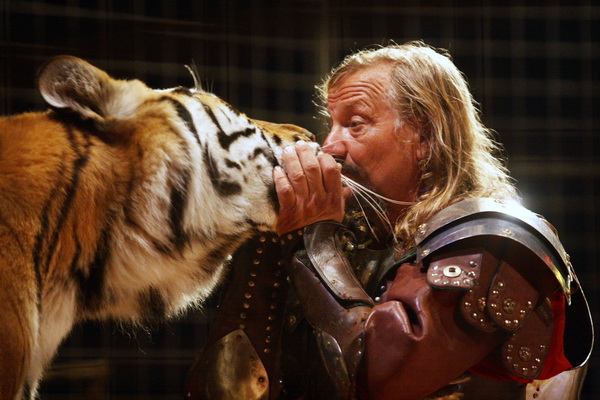 |
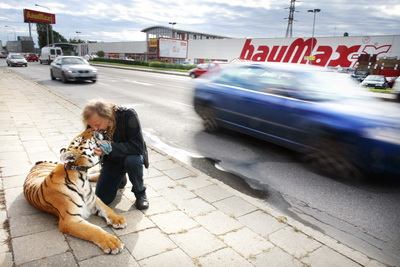 |
„This gladiator however is not a slave, does not fight for his bare life, but is, as a matter of fact, the ringmaster of the Circus Jo-Joo.”
 The circus as such has been a form of entertainment for hundreds of years. In days gone by, the circus folk traveled with their animals from town to town and village to village to entertain people. It experienced its peak of popularity in the 19th century. Circus tents became marquees, more and more exotic animals were included; the tremendous amount of hard work needed for running such a circus is beyond our imagination today. Before making full use of the railroad, horse carriages were the primary means of transportation. Journeys of 10 kilometers or more usually lasted for several days. Craftsmen and animal caretakers all used to be a part of the circus, something not so common today. A bond between the people of the circus and their job came into being a long time ago, spreading through families and generations. It is a craft that has been passed along from generation to generation and only the best have survived. Czech circus-owning families belonged among the world’s best, until the communist regime of the 1950s wrecked everything. Proud owners of marquee tents and animal quarters became ordinary citizens overnight, and if they wished to remain with the circus, they were left with the option of being mere employees. Many of these artists left the country, earning success and appreciation elsewhere.
The circus as such has been a form of entertainment for hundreds of years. In days gone by, the circus folk traveled with their animals from town to town and village to village to entertain people. It experienced its peak of popularity in the 19th century. Circus tents became marquees, more and more exotic animals were included; the tremendous amount of hard work needed for running such a circus is beyond our imagination today. Before making full use of the railroad, horse carriages were the primary means of transportation. Journeys of 10 kilometers or more usually lasted for several days. Craftsmen and animal caretakers all used to be a part of the circus, something not so common today. A bond between the people of the circus and their job came into being a long time ago, spreading through families and generations. It is a craft that has been passed along from generation to generation and only the best have survived. Czech circus-owning families belonged among the world’s best, until the communist regime of the 1950s wrecked everything. Proud owners of marquee tents and animal quarters became ordinary citizens overnight, and if they wished to remain with the circus, they were left with the option of being mere employees. Many of these artists left the country, earning success and appreciation elsewhere.
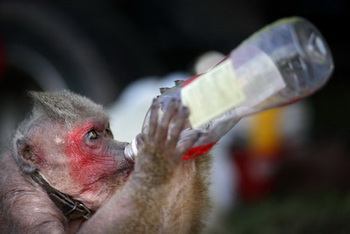 |
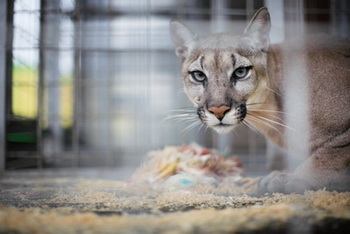 |
1989 marked the beginning of the return of many of these families to their old lifestyle. Circuses were established, continuing a long lost and nearly forgotten tradition or simply, for newcomers to the trade, started from scratch. It’s almost unthinkable that there are around 30 circus families in the Czech Republic; in Slovakia, surprisingly, there is not a single one. It’s odd enough that so many circuses can all survive and profit. Unlike the case of Germany or France, circus craft is not regarded as art under the Ministry of Culture, meaning no donations from the government. Every ringmaster cannot be merely an ordinary carnie, he needs to be a good businessman and manager as well in order to be able to fill seats as this provides the primary portion of the circus’ income. The expenses of running a circus are rather high. You need to account for travel, rent, food for the animals, veterinary check-ups, energy bills, and equipment maintenance.
 Not every circus is a model example for beginning entrepreneurs. Circus Jo-Joo belongs among the top three. Why? Passing by the marquee tent you would likely consider it a normal circus. The difference is the people around it. In 1990, the Joo family picked up on the tradition and history of the Circus Jadran, nationalized in 1952. And from the beginning, they succeeded in fulfilling the motto of ringmaster Jaromir Joo, “Without the circus, romance would be long gone.” And he certainly enjoys it to the fullest possible extent. He loves everything that breathes, especially of the feline variety. He plays with pumas, panthers, and tigers on a regular basis, and has been extremely successful in breeding an endangered species, the Siberian tiger. It’s nothing out of the ordinary to see him taking a walk with a tiger around the circus or cuddling with a panther right outside his trailer. “A lion is the king of the jungle by all means, but the tiger is nobility and pumas have the most intriguing eyes in the world,” states ringmaster Jaromir. Another reason for their success is the presence of foreign artists. In Czech circuses today, the norm is to have only family members as employees, where the ringmaster himself has several artistic shows or drills with tamed animals and during the break he sells hot dogs. No matter how much effort or time you put in, it can’t be done without a minimum number of people. An injury comes and part of the show is gone. Circus Jo-Joo is different. Snake lady, who has received an award at the Monte Carlo Circus Festival, comes from Mongolia, while some of the other artists are Bulgarian. In case of an emergency, they have a back-up so that viewers are never left unsatisfied.
Not every circus is a model example for beginning entrepreneurs. Circus Jo-Joo belongs among the top three. Why? Passing by the marquee tent you would likely consider it a normal circus. The difference is the people around it. In 1990, the Joo family picked up on the tradition and history of the Circus Jadran, nationalized in 1952. And from the beginning, they succeeded in fulfilling the motto of ringmaster Jaromir Joo, “Without the circus, romance would be long gone.” And he certainly enjoys it to the fullest possible extent. He loves everything that breathes, especially of the feline variety. He plays with pumas, panthers, and tigers on a regular basis, and has been extremely successful in breeding an endangered species, the Siberian tiger. It’s nothing out of the ordinary to see him taking a walk with a tiger around the circus or cuddling with a panther right outside his trailer. “A lion is the king of the jungle by all means, but the tiger is nobility and pumas have the most intriguing eyes in the world,” states ringmaster Jaromir. Another reason for their success is the presence of foreign artists. In Czech circuses today, the norm is to have only family members as employees, where the ringmaster himself has several artistic shows or drills with tamed animals and during the break he sells hot dogs. No matter how much effort or time you put in, it can’t be done without a minimum number of people. An injury comes and part of the show is gone. Circus Jo-Joo is different. Snake lady, who has received an award at the Monte Carlo Circus Festival, comes from Mongolia, while some of the other artists are Bulgarian. In case of an emergency, they have a back-up so that viewers are never left unsatisfied.
„Without the circus, romance would be long gone.”
 A circus is not all about beauty. Visitors can see the bright colors of the marquee, often located next to the residential areas in the outskirts of a city. Workers of the circus greet you with fancy uniforms as if you were standing next to a tsarist officer and invite you into a dark marquee tent, evoking feelings of expectation. A clown is selling balloons and you can smell popcorn and cotton candy. You take your seat and enjoy the atmosphere. You push away the everyday woes, savor the present and let your children take pictures with a tiger or ride a pony during the break. You return home full of excitement, knowing your kids had a great time. For the workers of the circus, it is all part of a huge effort and a long, stressful day. The show is merely the cherry on top of a cake of effort, sweat, and costs – everything needs to be set up in advance and then work exactly as planned. If the circus plans to change locations, the last show is usually on a Sunday afternoon. Then, all the chaos and turmoil begin. Confusion often reigns as the dismantling of the circus takes place. The system is not easy to follow and can be fully understood only after one experiences the process of building and dismantling it several times. Dealing with the animal cages and the animal’s waste alone can take well into the night. A few hours sleep is followed by an exhausting journey to a different location the next morning. Upon arrival, the process of hard-work begins again and sometimes lasts for tens of hours. This goes on week after week and only in the case of larger cities does a circus stay for several days.
A circus is not all about beauty. Visitors can see the bright colors of the marquee, often located next to the residential areas in the outskirts of a city. Workers of the circus greet you with fancy uniforms as if you were standing next to a tsarist officer and invite you into a dark marquee tent, evoking feelings of expectation. A clown is selling balloons and you can smell popcorn and cotton candy. You take your seat and enjoy the atmosphere. You push away the everyday woes, savor the present and let your children take pictures with a tiger or ride a pony during the break. You return home full of excitement, knowing your kids had a great time. For the workers of the circus, it is all part of a huge effort and a long, stressful day. The show is merely the cherry on top of a cake of effort, sweat, and costs – everything needs to be set up in advance and then work exactly as planned. If the circus plans to change locations, the last show is usually on a Sunday afternoon. Then, all the chaos and turmoil begin. Confusion often reigns as the dismantling of the circus takes place. The system is not easy to follow and can be fully understood only after one experiences the process of building and dismantling it several times. Dealing with the animal cages and the animal’s waste alone can take well into the night. A few hours sleep is followed by an exhausting journey to a different location the next morning. Upon arrival, the process of hard-work begins again and sometimes lasts for tens of hours. This goes on week after week and only in the case of larger cities does a circus stay for several days.
At times, a circus connects different fates and destinies. It’s not only about the ringmaster and his dreams of romance that are fulfilled by his proud ownership of beautiful wild animals. It’s about fate and ordinary people that are connected with the circus. Why do they set out on long exhausting travels without their loved ones? The answer is simple. Destiny hasn’t been kind to them and the circus lets them forget; they wish to realize their dreams of traveling and getting to know new places.
 |
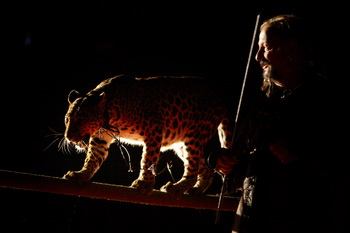 |
People come and go, but the circus remains in its romantic sphere; it also extends human capabilities, encourages a passion for beauty, perfection, courage and aspiration. All this applies to the Jo-Joo Circus of the Joo family. And, as they state, a sell-out crowd is the best possible reward they can receive, telling them they have done their jobs well.
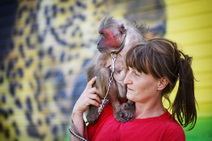 |
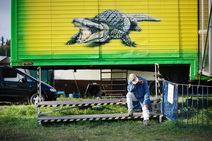 |
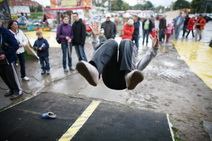 |
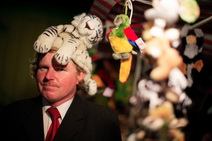 |
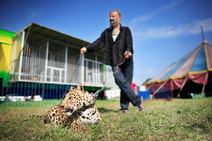 |
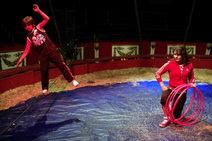 |
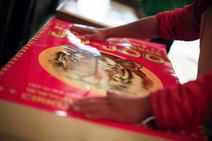 |
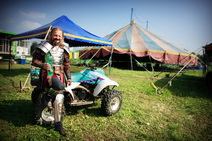 |
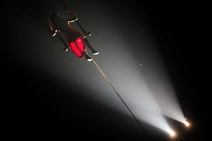 |
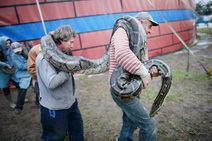 |
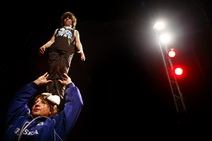 |
 |
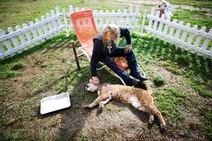 |
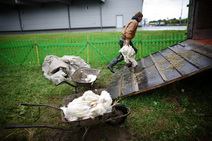 |
 |
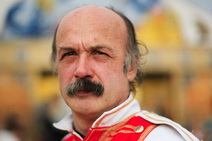 |
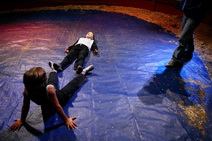 |
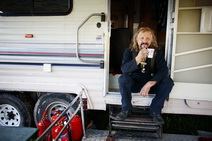 |
